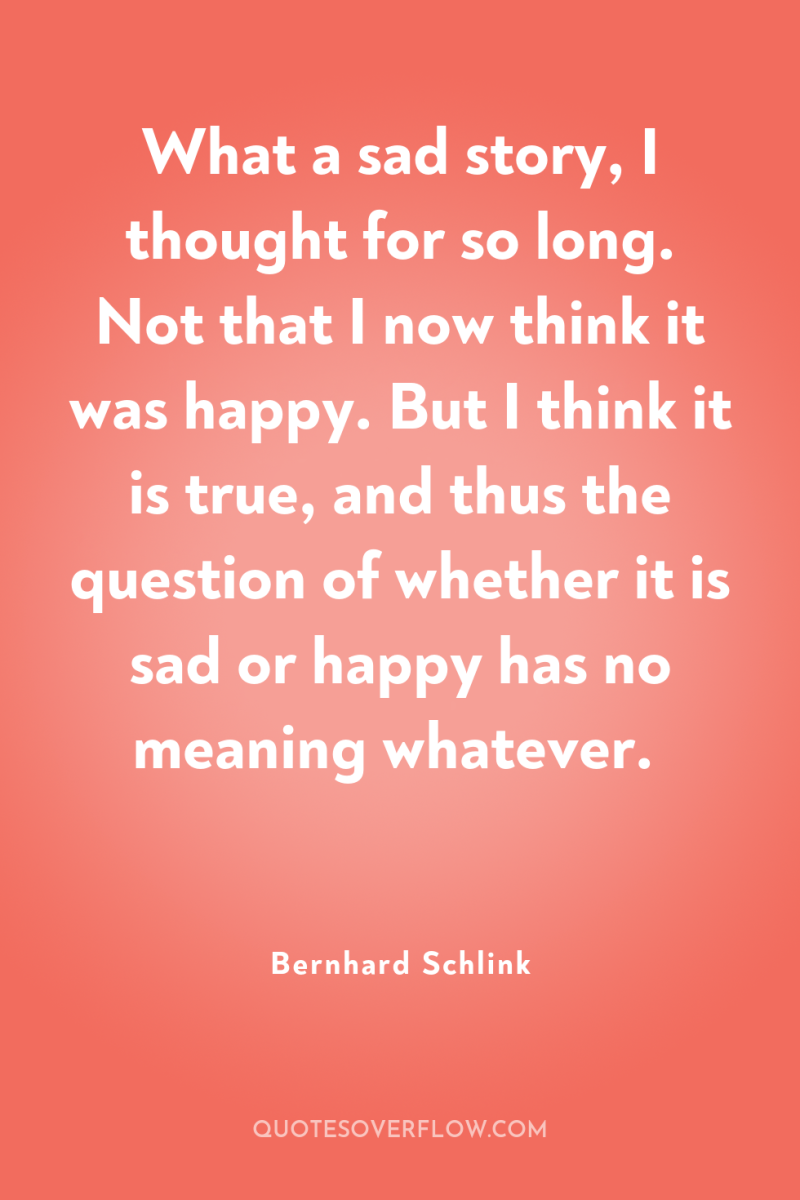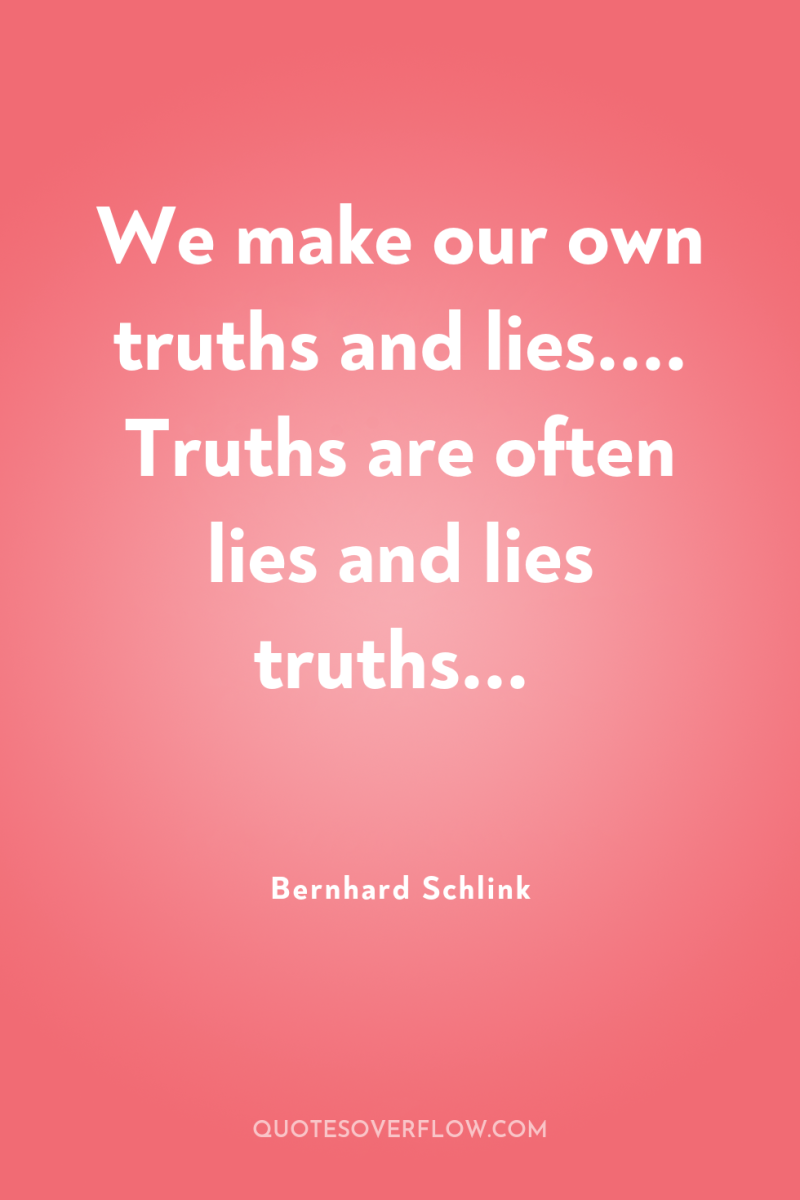1
I'm not frightened. I'm not frightened of anything. The more I suffer, the more I love. Danger will only increase my love. It will sharpen it, forgive its vice. I will be the only angel you need. You will leave life even more beautiful than you entered it. Heaven will take you back and look at you and say: Only one thing can make a soul complete and that thing is love.Bernhard Schlink

2
What a sad story, I thought for so long. Not that I now think it was happy. But I think it is true, and thus the question of whether it is sad or happy has no meaning whatever.Bernhard Schlink
3
Why? Why does what was beautiful suddenly shatter in hindsight because it concealed dark truths? Why does the memory of years of happy marriage turn to gall when our partner is revealed to have had a lover all those years? Because such a situation makes it impossible to be happy? But we were happy! Sometimes the memory of happiness cannot stay true because it ended unhappily. Because happiness is only real if it lasts forever? Because things always end painfully if they contained pain, conscious or unconscious, all along? But what is unconscious, unrecognized pain? .Bernhard Schlink

4
Când ne deschidemtu mie şi eu ţie, când ne scufundămtu în mine şi eu în tine, când ne pierdemtu în mine şi eu în tine, Abia atuncieu sunt euşi tu eşti tu.Bernhard Schlink

5
We make our own truths and lies.... Truths are often lies and lies truths...Bernhard Schlink
6
Being ill when you are a child or growing up is such an enchanted interlude! The outside world, the world of free time in the yard or the garden or on the street, is only a distant murmmur in the sickroom. Inside, a whole world of characters and stories proliferate out of the books you read. The fever that weakens your perception as it sharpens your imagination turns the sickroom into something new, both familiar and strange; monsters come grinning out of the patterns on the curtains and the carpet, and chairs, tables, bookcases and wardrobes burst out of their normal shapes and become mountains and buildings and ships you can almost touch although they're far away. Through the long hours of the night you have the Church clock for company and the rumble of the occasional passing car that throws it's headlights across the walls and ceilings. These are hours without sleep, which is not to say they're sleepless, because on the contrary, they're not about lack of anything, they are rich and full. Desires, memories, fears, passions form labryinths in which we lose and find then lose ourselves again. They are hours where anything is possible, good or bad. .Bernhard Schlink
7
I could never stop comparing the way it was with Gertrud and the way it had been with Hanna; again and again, Gertrud and I would hold each other, and I would feel that something was wrong, that she was wrong, that she moved wrong and felt wrong, smelled wrong and tasted wrong. I thought I would get over it. I hoped it would go away. I wanted to be free of Hanna. But I never got over the feeling that something was wrong.Bernhard Schlink
8
Philosophy has forgotten about childrenBernhard Schlink
9
Is this what sadness is all about? Is it what comes over us when beautiful memories shatter in hindsight because the remembered happiness fed not just on actual circumstances but on a promise that was not kept?Bernhard Schlink
10
Is that what makes me sad? The eagerness and belief that filled me then and exacted a pledge from life that life could never fulfill?Bernhard Schlink
11
When he answered, he went all the way back to beginnings. He instructed me about the individual, about freedom and dignity, about the human being as subject and the fact that one may not turn him into an object. “Don’t you remember how furious you would get as a little boy when Mama knew better what was good for you? Even how far one can act like this with children is a real problem. It is a philosophical problem, but philosophy does not concern itself with children. It leaves them to pedagogy, where they’re not in very good hands. Philosophy has forgotten about children.” He smiled at me. “Forgotten them forever, not just sometimes, the way I forget about you.”“ But . .”“But with adults I see absolutely no justification for setting other people’s views of what is good for them above their own ideas of what is good for themselves.”“ Not even if they themselves are happy about it later?” He shook his head. “We’re not talking about happiness, we’re talking about dignity and freedom. Even as a little boy, you knew the difference. It was no comfort to you that your mother was always right.Bernhard Schlink
12
Does everyone feel this way? When I was young, I was perpetually overconfident or insecure. Either I felt completely useless, unattractive, and worthless, or that I was pretty much a success, and everything I did was bound to succeed. When I was confident, I could overcome the hardest challenges. But all it took was the smallest setback for me to be sure that I was utterly worthless. Regaining my self-confidence had nothing to do with success..whether I experienced it as a failure or triumph was utterly dependent on my mood.Bernhard Schlink
13
Did my moral upbrining somehow turn against itself? If looking at someone with desire was as bad as satisfying the desire, if having an active fantasy was as bad as the act you were fantasizing- then why not the satisfaction and the act itself? As the days went on, I discovered that I couldn't stop thinking sinful thoughts. In which case I also wanted the sin itself.Bernhard Schlink
14
What is law? Is it what is on the books, or what is actually enacted and obeyed in a society? Or is law what must be enacted and obeyed, whether or not it is on the books, if things are to go right?Bernhard Schlink
15
They waited awhile before lighting the candles; the gloom allowed the past to slip cozily into the present. But the memories were of a time that was gone and didn't overshadow the present. But the memories were vivid, and they made the freinds feel both young and old.. When Chrsitanne finally lit the candles and they saw one another clearly again, she was happy to see in the old faces of the others the young faces they had come across in their memories. we store our youth wihtin us, we can go back to it and find ourselves in it, but it is past--melancholy filled their hearsts, and sympahty, for one another and for themsleves.Bernhard Schlink
16
It is as if people refused to leave their dead alone, forced them back into the light, made them keep their composure even in death.Bernhard Schlink
17
Why does what was beautiful shatter in hindsight because it concealed dark truths?Bernhard Schlink
18
But the finger I pointed at her turned back to me. I had loved her. Not only had I loved her, I had chosen her.Bernhard Schlink
19
As I looked and looked, the living face became visible in the dead, the young in the old. This is what must happen to old married couples, I thought: the young man is preserved in the old one for her, the beauty and grace of the young woman stay fresh in the old one for him.Bernhard Schlink
20
The Odyssey is the story of motion both purposeful and purposeless, successful and futile. What else is the history of law?Bernhard Schlink
21
Bravery is good when the cause is good.Bernhard Schlink
22
People ask all the time what I learned in the camps. But the camps weren’t therapy. What do you think these places were? Universities? We didn’t go there to learn. One becomes very clear about these things. What are you asking for? Forgiveness for her? Or do you just want to feel better yourself? My advice, go to the theatre, if you want catharsis, please. Go to literature. Don't go to the camps. Nothing comes out of the camps. Nothing.Bernhard Schlink
23
What should our second generation have done, what should it do with the knowledge of the horrors of the extermination of the Jews? We should not believe we can comprehend the incomprehensible, we may not compare the incomparable, we may not inquire because to inquire is to make the horrors an object of discussion, even if the horrors themselves are not questioned, instead of accepting them as something in the face of which we can only fall silent in revulsion, shame and guilt. Should we only fall silent in revulsion, shame and guilt? To what purpose? .Bernhard Schlink
24
Exploration! Exploring the past! We students in the camps seminar considered ourselves radical explorers. We tore open the windows and let in the air, the wind that finally whirled away the dust that society had permitted to settle over the horrors of the past. We made sure people could see. And we placed no reliance on legal scholarship. It was evident to us that there had to be convictions. It was just as evident as conviction of this or that camp guard or police enforcer was only the prelude. The generation that had been served by the guards and enforcers, or had done nothing to stop them, or had not banished them from its midst as it could have done after 1945, was in the dock, and we explored it, subjected it to trial by daylight, and condemned it to shame. .Bernhard Schlink
25
I can't say I'm thankful about being German because I sometimes experience it as a huge burden. But it is an integral part of me and I wouldn't want to escape it. I have accepted it.Bernhard Schlink